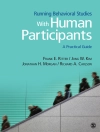Richard Carlson is Professor of Psychology at Penn State University, where he has been on the faculty for 27 years. He received his B.S.S. from Cornell College and his Ph.D. from the University of Illinois. He conducts experiments examining cognitive control, cognitive skill, and conscious awareness, focusing on control at the time scale of one second or less. Previous research has addressed topics such as causal thinking, the development of troubleshooting skill, task switching, the role of gesture in mental arithmetic, and the structure of conscious intentions. Current research projects focus on the role of affect in working memory and cognitive control, the effect of cognitive workload on metacognition, and on changes in metacognition with increasing skill. He has published in journals such as Journal of Experimental Psychology: Learning, Memory, and Cognition, Memory & Cognition, and Human Factors. His book, Experienced Cognition (1998), which described a theory of consciousness and cognitive skill, won a Choice Outstanding Academic Book award. Professor Carlson currently serves as Associate Head and Director of Undergraduate Studies in Penn State′s Department of Psychology. He is the founding coordinator of the Department′s online psychology major. In 2009, he received an Outstanding Faculty Adviser award. He serves on the editorial boards of the Journal of Experimental Psychology: Learning, Memory, and Cognition, Behavior Research Methods, and The American Journal of Psychology. He is a fellow of the APA. His website is http://psych.la.psu.edu/directory/faculty-bios/carlson.html
6 Ebooks tarafından Frank E. Ritter
Frank E. Ritter & Jong W. Kim: Running Behavioral Studies With Human Participants
Running Behavioral Experiments With Human Participants: A Practical Guide provides a concrete, practical roadmap for the implementation of experiments and controlled observation using human participa …
PDF
İngilizce
DRM
€52.99
Erno Lehtinen & Josef Nerb: In Order to Learn
Order affects the results you get: Different orders of presenting material can lead to qualitatively and quantitatively different learning outcomes. These differences occur in both natural and artifi …
EPUB
İngilizce
DRM
€76.89
Erno Lehtinen & Josef Nerb: In Order to Learn
Order affects the results you get: Different orders of presenting material can lead to qualitatively and quantitatively different learning outcomes. These differences occur in both natural and artifi …
PDF
İngilizce
DRM
€112.61
Gordon D. Baxter & Elizabeth F. Churchill: Foundations for Designing User-Centered Systems
Foundations for Designing User-Centered Systems introduces the fundamental human capabilities and characteristics that influence how people use interactive technologies. Organized into four main area …
PDF
İngilizce
DRM
€41.21
Jacob D. Oury & Frank E. Ritter: Building Better Interfaces for Remote Autonomous Systems
This ‘Open Access’ Springer Brief provides foundational knowledge for designing autonomous, asynchronous systems and explains aspects of users relevant to designing for these systems, introduces prin …
EPUB
İngilizce
DRM
€3.83
Richard A. (Alan) (The Pennsylvania State University, USA) Carlson & Jong W. (University of Central Florida, Orlando, USA) Kim: Running Behavioral Studies With Human Participants : A Practical Guide
Running Behavioral Experiments With Human Participants: A Practical Guide provides a concrete, practical roadmap for the implementation of experiments and controlled observation using human participa …
EPUB
İngilizce
DRM
€47.68






